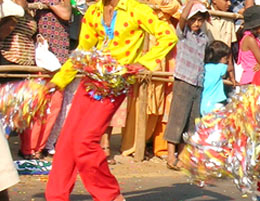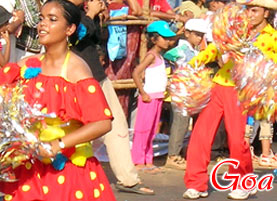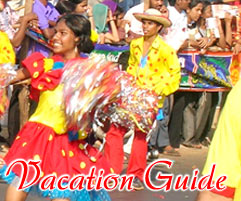When
one talks about the dances of Goa, your imagination tends to stop at
people dancing to trance and techno music. In case you didn't know, the
Goan dances extend much beyond those rave late night parties at beaches.
The traditional dance of Goa gives a picture of the mindset and
lifestyle of Goans. They reflect the rich historical and cultural legacy
that Goa abounds in. Goa has a unique amalgamation of different cultures
and the Goan dances portray this blend of different faiths very
beautifully. Some very popular folk dances of Goa are Dhalo, Dekhni,
Fugdi, Shigmo, Kunbi, Lamp Dance, etc.
Dhalo
One of the most popular dances of Goa is the Dhalo. It is one of the
choicest dances of the women dwelling in rural Goa. In this dance form,
young girls and women form a semi circle by joining their hands behind
each others waists. They then sway in coordinated movements to beats of
rural musical instruments and music. It is a dance full of fun and
frolic.
Dekhni
The Dekhni is basically the traditional dance of those Christians who
converted to Christianity from Hinduism during the Portugal rule. These
people were the ones to compose this traditional dance form of Goa. The
dance also involves singing by people. It usually begins with a
beautiful lady starting the dance and is joined later by other dancers
gradually. The music of this dance is a lovely combination of rhythm and
melody of both western and Indian genre.
Fugdi
The Fugdi is a traditional dance of Goa that is quite popular among the
womenfolk of Goa. This dance is devoted to the Hindu Elephant God, Lord
Ganesha. This dance can be performed on any occasion and does not
require any particular festival to be performed. One of the most common
dances that is performed in Goa, this dance requires continues swirling
until one gets exhausted and sits down.
Shigmo
The Shigmo is a traditional dance of Goa and is performed during the
advent of spring season. For farmers, this dance is symbolic of
regeneration of their natural resources. This dance is also performed
when soldiers return from the battlefield victorious in their mission.
This dance is performed mostly during the month of March when temples
are decorated lavishly to celebrate the spring festival.
Kunbi
One of the earliest folk dances of Goa is the Kunbi dance. This dance
was mainly performed by the earliest settlers of Goa known as the
Kunbis. The dance has more of a social element in it rather than a
religious feeling. The dance is performed by the women dancers who
perform this dance very elegantly at quite a fast pace. Their
traditional attire adds the color to this dance form.
Lamp Dance
The Lamp Dance is called so because of the brass lamps that is used to
perform this dance. The dancers have to dance very slowly balancing
heavy brass lamps on their heads. The music is usually instrumental and
folk instruments like Ghumat, Samael, Cymbal and Harmonium are used.
This dance requires immense amount of self control and discipline in
order to balance the lamps and dance.




